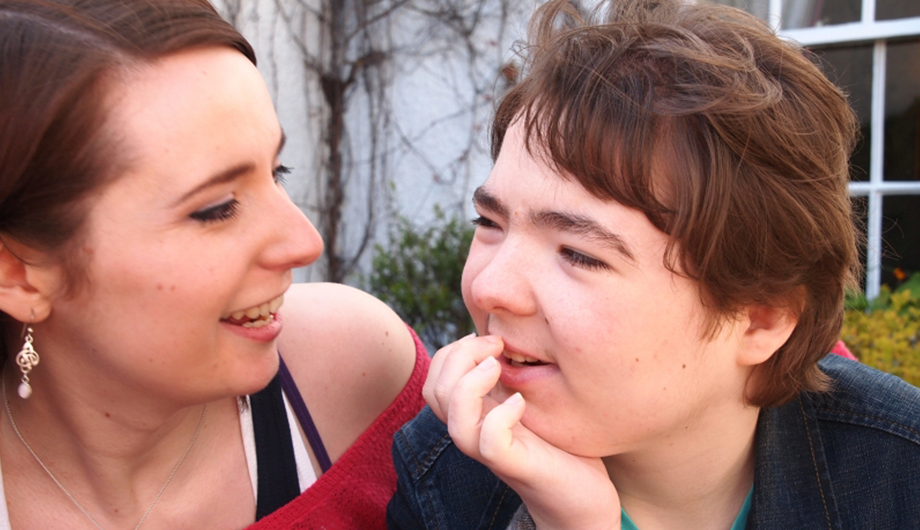Information from the CBF
All CBF information sheets are available to download free of charge on this website. To order hard copies of information packs or DVDs visit our shop.
Working in partnership
Find out more on our ‘working in partnership’ page
This page covers:
- Working in partnership with families. Why it’s important for professionals to work closely with families.
- Barriers to partnership working. A look at what kind of barriers there can be to professionals and families working together.
- Successful partnership working. Some ideas for working together successfully.
Resources from the Challenging Behaviour – National Strategy Group
Visit page: Challenging Behaviour – National Strategy Group
Challenging Behaviour Charter
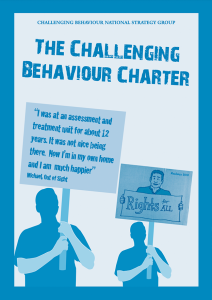
Sign up to the Challenging Behaviour Charter and commit to endorsing the rights of individuals with severe learning disabilities who are perceived as challenging to services and others.
Find out more about the Challenging Behaviour Charter
Positive Behaviour Support
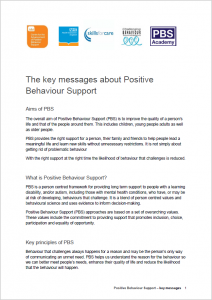
PBS is a holistic, person-centred approach that considers the quality of a person’s life and those of the people around them.
Read this information sheet for an introduction to PBS and how it should be carried out to ensure the best outcomes for people with a learning disability. What is PBS? Why is it effective? And how can it be delivered successfully?
CB-NSG Resources for Commissioners
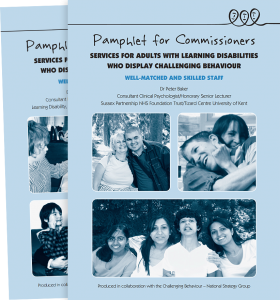
CB-NSG members have developed two pamphlets to support commissioners to commission services for children, young people and adults with learning disabilities whose behaviour challenges.
- Services for Adults with Learning Disabilities who display Challenging Behaviour
- Services for Children and Young People who display challenging behaviour
CB-NSG members are in the process of developing further resources for commissioners which we expect to be finalised in 2024. We will be distributing these to commissioners via various networks once they are completed, and will also upload them to our website.
Promoting Resilience
This checklist will enable providers to implement practical, evidence-based strategies for increasing the resilience of operational staff.
Older CBF Resources
Social Care Institute for Excellence ‘At-a-Glance’ Guides (2011)
Three ‘At a glance’ guides aimed at family carers supporting people whose behaviour is described as challenging are available. The guides have been developed in collaboration with the Social Care Institute for Excellence(SCIE). There are separate guides for adults, teenagers and children.
-
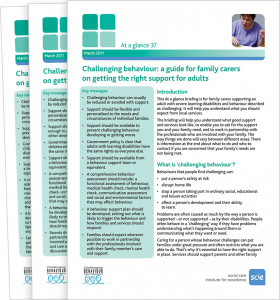 At a glance 38. Challenging behaviour: a guide for family carers on getting the right support for children. Social Care Institute for Excellence.
At a glance 38. Challenging behaviour: a guide for family carers on getting the right support for children. Social Care Institute for Excellence. - At a glance 39. Challenging behaviour: a guide for family carers on getting the right support for teenagers. Social Care Institute for Excellence.
- At a glance 37. Challenging behaviour: a guide for family carers on getting the right support for adults. Social Care Institute for Excellence.
Other best practice guides and resources
Please note that some of these guides are older – while we are keeping these on as we believe that they contain useful information, please check to see if any policies or laws mentioned in these are still in force.
- Better health, better lives: Children and young people with intellectual disabilities and their families. World Health Organisation (2010).
- Challenging Behaviour: a unified approach. Clinical and service guidelines for supporting people with learning disabilities who are at risk of receiving abusive or restrictive practices (2007)
- Putting People First: Working together for change: using person centred information for commissioning (2009)
- The Association for Supported Living (ASL): There is an Alternative (2011)
- RCSLT – Five good communication standards: Reasonable adjustments to communication that individuals with learning disability and/or autism should expect in specialist hospital and residential settings (2013)
- Royal College of Psychiatrists’ Faculty of Psychiatry of Intellectual Disability: People with learning disability and mental health, behavioural or forensic problems: the role of in-patient services (2013)
- NICE Quality Standard Learning Disability: behaviour that challenges. Covers care and support and services for children, young people and adults with a learning disability (or a learning disability and autism) and behaviour that challenges, and their families and carers. (Updated 2019)

